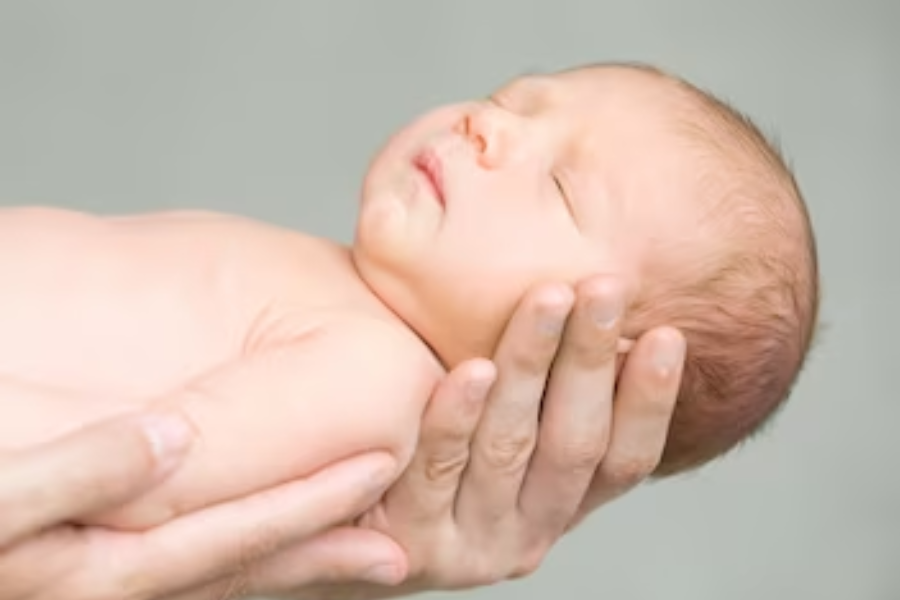
Does Umbilical Hernia In Babies Need Treatment?
29 Apr 2023 | 6 min Read
Manisha Pradhan
Author | 1053 Articles
An umbilical hernia in babies is a relatively common condition, affecting approximately 10% of all babies. It is like a soft swelling or bulge near a baby’s belly button, which is usually visible only when a baby cries, strains or coughs. cry, cough or strain.
This condition is usually harmless and normally resolves on its own. But what are the causes, symptoms, and treatment options for umbilical hernias in babies? Does umbilical hernia in babies need treatment?
Here’s all that you need to know.
What Is An Umbilical Hernia?
An umbilical hernia in babies occurs when part of the intestine, or occasionally, other abdominal organs, protrudes through a weak spot in the abdominal wall near the belly button. The umbilical cord passes through this area during pregnancy, and it usually closes up after birth.
However, in some cases, the muscles around the belly button don’t fully close, leaving a small opening through which the organs can protrude.
Causes and Risk Factors of Umbilical Hernia in Babies
The exact cause of umbilical hernias in babies is unknown, but it is believed to be a combination of genetic and environmental factors. Some risk factors for developing an umbilical hernia include:
Premature birth
Preterm babies are more likely to develop umbilical hernias due to the underdevelopment of their abdominal muscles.
Low birth weight
Babies with low birth weight have a higher risk of umbilical hernias, as their abdominal muscles may not be fully developed.
Family history
If a close family member had an umbilical hernia, the baby is more likely to develop one as well.
Certain medical conditions
Babies with Down syndrome or other congenital disorders have a higher risk of developing umbilical hernias.
Symptoms Of Umbilical Hernia In Babies
An umbilical hernia typically appears as a soft, painless bulge near the baby’s belly button. The bulge may become more prominent when the baby cries, coughs, or strains, and it may disappear when the baby is calm or lying down. In most cases, umbilical hernias do not cause any discomfort or complications for the baby.
When To Seek Medical Attention
While most umbilical hernias do not require immediate medical intervention, there are some cases in which you should consult a healthcare professional.
Seek medical attention if:
The hernia becomes painful, swollen, or discoloured: This could indicate that the blood supply to the protruding organs has been compromised, which requires urgent treatment.

The hernia does not reduce in size by the time the child is 1-2 years old: In this case, the hernia may not resolve on its own and may require surgical intervention.
The hernia is very large or continues to grow: A large or growing hernia may have a higher risk of complications and may require surgery.
Treatment Of Umbilical Hernia In Kids
In most cases, umbilical hernias in babies resolve without any treatment. As the child grows, the abdominal muscles typically strengthen, and the hernia may close on its own. Approximately 90% of umbilical hernias close by the time the child is 2 years old. In cases where the hernia does not close on its own, surgical intervention may be required.
Surgical Treatment
If a hernia is deemed to be at risk of complications or has not closed by the age of 2-4 years, a pediatric surgeon may recommend surgery. The surgical procedure to repair an umbilical hernia is relatively simple and has a high success rate.
The surgery is usually performed under general anaesthesia and involves making a small incision near the belly button to push the protruding organs back into the abdominal cavity and closing the opening in the abdominal wall with sutures. In some cases, a mesh may be used to reinforce the abdominal wall and prevent recurrence.
Recovery And Post-Surgical Care Of Umbilical Hernia In Babies
After the surgery, your child will be closely monitored in the recovery room for a few hours before being discharged. The surgeon will provide you with specific instructions on how to care for your child during the recovery period, which usually lasts a few days to a week. Some common post-surgical care guidelines include:
Pain management
The doctor may prescribe pain medication to help manage any discomfort your child experiences after surgery. It is essential to follow the dosage instructions carefully.
Wound care
Keep the surgical site clean and dry, and follow any instructions provided by the surgeon regarding bathing and dressing changes.
Activity restrictions
Your child may need to avoid strenuous activities or heavy lifting for a few weeks following the surgery to allow the abdominal muscles to heal properly.
Follow-up appointments
It is crucial to attend any scheduled follow-up appointments to ensure the surgical site is healing correctly and to address any concerns or complications.

Preventing Complications Of Umbilical Hernia In Babies
While complications from umbilical hernia surgery are rare, parents should be aware of the potential risks and take steps to prevent them. Some preventive measures include:
- Follow the surgeon’s post-operative care instructions closely to minimize the risk of infection or other complications.
- Ensure your child maintains a healthy diet and gets regular exercise to promote optimal healing and overall health.
- Encourage your child to avoid lifting heavy objects or participating in strenuous activities during the recovery period.
Umbilical hernias in babies are a common and usually harmless condition that often resolves on its own as the child grows. However, parents must monitor the hernia for any signs of complications and seek medical attention when necessary.
In cases where the hernia does not close on its own, surgical intervention may be required to repair the opening in the abdominal wall. By understanding the causes, symptoms, and treatment options for umbilical hernias in babies, parents can make informed decisions about their child’s health and ensure they receive appropriate care if needed.
Recommended natural products for babies
Also Read:
13 Tips On Creating A Safe Environment When A Baby Starts Crawling
Bipasha Basu Loves Dancing With Daughter Devi: Benefits Of Dance And Music For Babies
Cover image source: freepik
A


Related Topics for you
Suggestions offered by doctors on BabyChakra are of advisory nature i.e., for educational and informational purposes only. Content posted on, created for, or compiled by BabyChakra is not intended or designed to replace your doctor's independent judgment about any symptom, condition, or the appropriateness or risks of a procedure or treatment for a given person.


